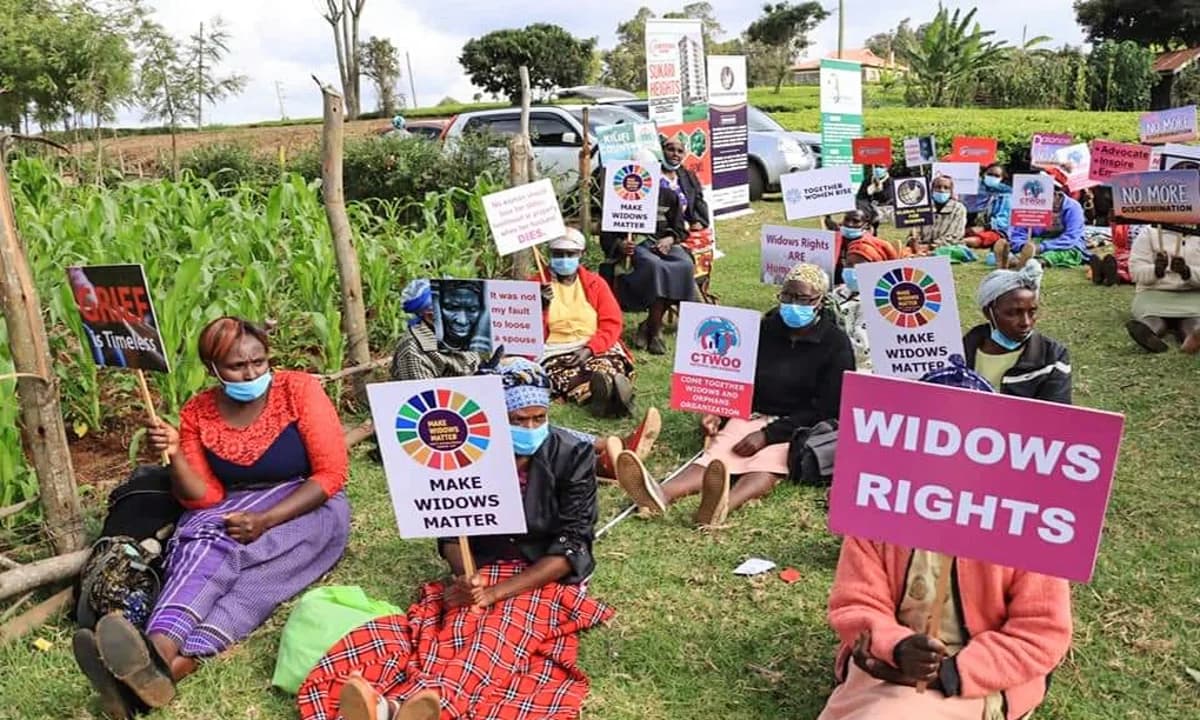We're loading the full news article for you. This includes the article content, images, author information, and related articles.
Despite progressive laws, many rural Kenyan widows face significant challenges in inheriting and controlling land, a critical resource for their economic stability and food security, due to deeply entrenched patriarchal norms and customary practices.

In rural Kenya, the death of a husband often marks the beginning of a brutal battle for widows seeking to retain their land rights. While the Kenyan Constitution and recent legislation aim to protect women's property rights, deeply ingrained cultural practices and patriarchal systems frequently undermine these legal provisions, leaving many widows vulnerable to disinheritance and poverty.
Regina Mwaura, a widow who lost 500kg of tea to intimidation after her husband's death in 2013, successfully navigated the succession process and now assists other women in similar predicaments. Her experience highlights the persistent struggle faced by countless widows across the country.
Historically, women in Kenya, particularly in rural areas, have faced significant bias in land ownership and control. Traditional customs often dictate that land is inherited through the male lineage, relegating women to secondary rights of use rather than outright ownership.
The promulgation of the 2010 Kenyan Constitution was a landmark moment, guaranteeing equal rights for all persons, including non-discrimination based on sex or marital status, and specifically providing for women's rights to matrimonial property and protection for dependents of deceased landowners.
Several legal frameworks support women's land rights in Kenya:
Despite these progressive laws, practical challenges persist. Kabale Tache, CEO of the National Land Commission, noted on Wednesday, October 8, 2025, that while constitutional provisions have advanced women's land rights, implementation remains difficult. Customary laws often supersede formal legal frameworks in practice, prioritising male inheritance and excluding women.
Organisations like the Kenya Land Alliance (KLA), Kenya Legal and Ethical Issues Network on HIV & AIDS (KELIN), AfriNOV, and the Rona Foundation are actively working to empower widows and advocate for their land rights.
Regina Mwaura, a beneficiary of such support, now helps other widows navigate the complex succession process, emphasising the importance of registering marriages to prevent disinheritance. Sarah, the founder of Nandi Women Network, supported by AfriNOV, shared her experience of being forcefully evicted from her matrimonial home and how the network has helped over 15 widows in Nandi County secure their land rights.
Millicent Adhiambo, advocacy lead at Habitat for Humanity Kenya, highlights that women are often excluded from land discussions, leading to widespread ignorance about ownership processes, especially succession.
The lack of secure land rights for women has far-reaching implications, including economic insecurity, increased vulnerability to poverty, and limited access to credit facilities that often require land as collateral. This also hinders women's ability to make long-term investments in sustainable farming practices, impacting agricultural productivity and food security.
Disinheritance also exposes widows to domestic violence and limits their ability to leave abusive relationships. Some vulnerable widows are even tempted to give in to sexual advances from local chiefs in the hope of securing their land.
A significant challenge remains the disconnect between progressive legal frameworks and their practical implementation at the community level. Customary laws, which often discriminate against women's land ownership, still govern over 65% of land in Kenya. The lack of marriage registration, especially for customary marriages, further complicates the ability of widows to prove their marital status and claim inheritance.
There is also a reported issue of some chiefs omitting women's names when compiling lists of beneficiaries, leaving widows and daughters vulnerable.
The struggle for women's land rights has seen significant legal advancements over the past decade, particularly with the Matrimonial Property Act in November 2013. Grassroots efforts, such as the Widows Protection Bill drafted by widows in Siaya County, are emerging to safeguard women against retrogressive cultural practices.
The ongoing efforts by civil society organisations to raise awareness, provide legal aid, and advocate for policy implementation will be crucial. The effectiveness of alternative dispute resolution mechanisms, which have proven successful in some regions like Kisumu and Homa Bay, will also be a key area to watch. Continued focus on ensuring the registration of all marriages, including customary ones, is vital for securing women's inheritance rights.
Keep the conversation in one place—threads here stay linked to the story and in the forums.
Sign in to start a discussion
Start a conversation about this story and keep it linked here.
Other hot threads
E-sports and Gaming Community in Kenya
Active 9 months ago
The Role of Technology in Modern Agriculture (AgriTech)
Active 9 months ago
Popular Recreational Activities Across Counties
Active 9 months ago
Investing in Youth Sports Development Programs
Active 9 months ago